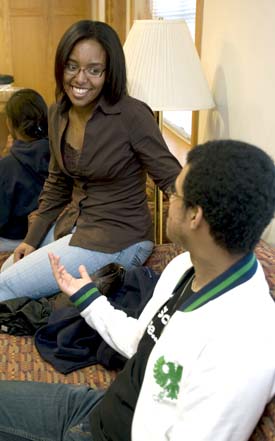Allison Pitt entered Washington University in 2004 unsure of what an engineer actually does. She leaves this spring having participated four years in a program that teaches high-school students the myriad things that engineers do.

“I was never exposed to any indoctrination about engineering before I came here,” Pitt says. “And I don’t know why that is. But working with St. Louis city high-schoolers, most of them minorities, for four years on weekends gave me a sense of enabling, of giving back.”
Pitt, who graduates May 16 with degrees in chemical engineering and in systems science and engineering, always has been strong in math and science. “I wanted chemical engineering because I love chemistry,” she said. “And I like efficiency and organization. So, I decided to work toward both degrees through the Process Control Systems Program.”
She has proven adept at problem solving. “She is an exceptional student,” says Ervin Y. Rodin, Ph.D., professor of applied math and systems science. “She rapidly mastered object-oriented computer programming, which is a crucial tool for the in-depth analysis of complex systems, but can be counterintuitive. Allison demonstrated excellent grasp of this kind of creative problem solving.
“She also is remarkably articulate and comfortable presenting her work,” Rodin says.
Pitt received a scholarship from the National Society of Black Engineers (NSBE) as a high-school senior. She was secretary of the WUSTL chapter her sophomore year; vice president junior year and president her senior year.
|
School of Engineering & Applied Science |
“As president, I’ve learned about leadership and group dynamics, too,” Pitt says. “I’m part of harnessing a passion in our members to increase the number of culturally responsible black engineers who excel academically, succeed professionally and positively impact the community. This is a national NSBE goal, but we work very hard on it here.”
Through NSBE, Pitt has worked in tutoring and mentoring programs like the high-school program. She has been influential in getting an NSBE Technical Outreach Community Help program going in north St. Louis, where it helped network a community center using donated WUSTL computers.
Pitt, who was accepted by 10 universities, chose WUSTL because she says she felt a warmth and caring here that she didn’t feel in some other schools she visited. She began her academic career as an Ervin Scholar.
“The previous year’s scholars were so helpful and understanding,” Pitt says. “When we started the regular school year, it was special to have a tightly knit group of friends going into the challenge of college.”
Pitt also was a McKelvey Scholar, which she finds an honor because she values James M. McKelvey, Ph.D., senior professor of chemical engineering and former dean of engineering, so highly as a teacher.
“Professor McKelvey taught thermodynamics, which was the bane of existence for any number of students from other universities that I know,” Pitt says.
“But Professor McKelvey made it easy. He explained things with such elegance and simplicity. It is a real honor to be in a program with his name on it,” she says.
Another aspect to Pitt: She sings. She joined Visions Choir, a gospel group that performs regularly at Graham Chapel, as a freshman and took voice classes the past six semesters. Some of her favorite artists are Alicia Keys, John Legend and Ella Fitzgerald. She recently did one of Fitzgerald’s classics at a voice master’s class, a mean version of “Cry Me a River.”
This fall, Pitt goes to Stanford University, where she will pursue a master’s in operations research in the management science and engineering department. She’s taking her future one step at a time but doesn’t rule out a doctorate and teaching.
“If some research topic really catches my interest, I might go after it and become a full-time professor,” she says. “If not, I’ve thought of being an adjunct at some university. I think it’s good for women and minority engineering students to know that they are represented in the field.”